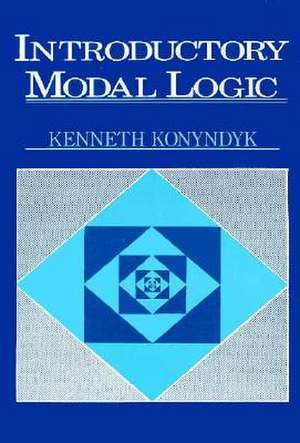Introductory Modal Logic
Autor Kenneth J. Konyndyk Jr.en Limba Engleză Paperback – 30 mai 1986
| Toate formatele și edițiile | Preț | Express |
|---|---|---|
| Paperback (1) | 224.39 lei 6-8 săpt. | |
| MR – University of Notre Dame Press – 30 mai 1986 | 224.39 lei 6-8 săpt. | |
| Hardback (1) | 584.07 lei 6-8 săpt. | |
| MR – University of Notre Dame Press – 30 mai 1986 | 584.07 lei 6-8 săpt. |
Preț: 224.39 lei
Nou
Puncte Express: 337
Preț estimativ în valută:
42.94€ • 45.91$ • 35.80£
42.94€ • 45.91$ • 35.80£
Carte tipărită la comandă
Livrare economică 17 aprilie-01 mai
Preluare comenzi: 021 569.72.76
Specificații
ISBN-13: 9780268011598
ISBN-10: 0268011591
Pagini: 144
Dimensiuni: 152 x 229 x 8 mm
Greutate: 0.25 kg
Ediția:1st Edition
Editura: MR – University of Notre Dame Press
ISBN-10: 0268011591
Pagini: 144
Dimensiuni: 152 x 229 x 8 mm
Greutate: 0.25 kg
Ediția:1st Edition
Editura: MR – University of Notre Dame Press
Notă biografică
Recenzii
"Kenneth Konyndyk's Introductory Modal Logic is a fine combinaton of accessibility and logical rigor. What is really impressive about it, however, is the splendid way it combines these two with determined attention to the achievement of philosophical understanding. Konyndyk constantly points out the questions and concerns that give philosophical interest to the logical topics he takes up; he motivates the logical developments by way of these philosophical concerns. A first rate text." —Alvin Plantinga
"Although Konyndyk's format is that of a textbook with exercises and the book presupposes a minimal knowledge of sentential and first-order quantification logic, it is an excellent introduction to modal logic for the general reader. . . . The discussion is always clear and as simple as one could ask." —Religious Studies Review
